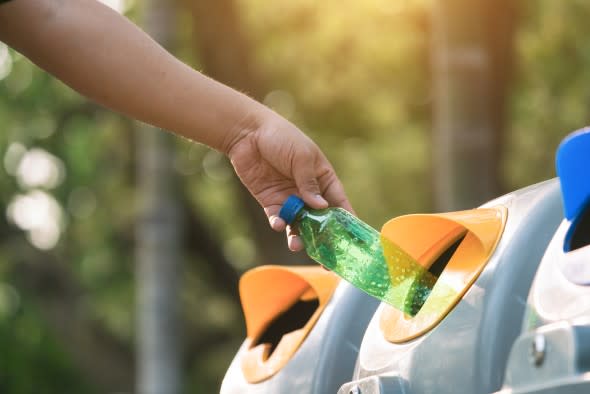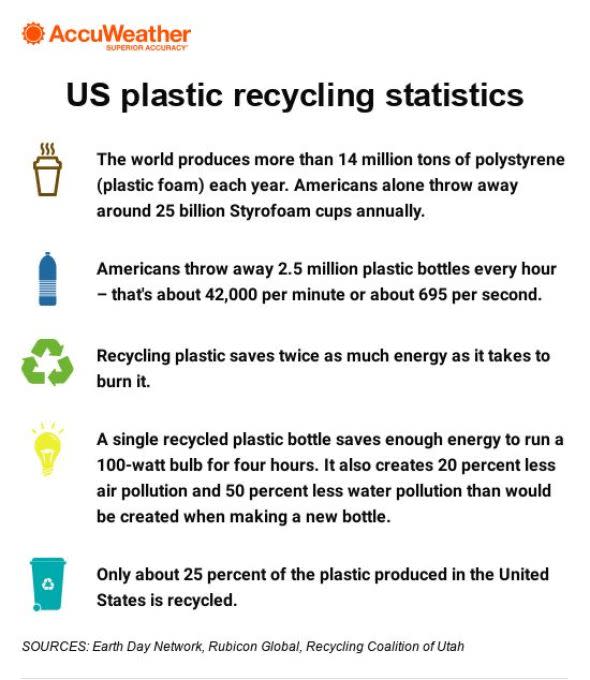America Recycles Day: Is recycling or reducing plastic better for the environment?
Humans are consuming resources and producing waste at a greater scale than ever before, according to the United Nations Environment Program (UNEP).
In the United States, Americans produce more than 30 percent of Earth's total waste, although the U.S. accounts for only 4 percent of the planet's population.
Americans also recycle only 30 percent of their waste, despite the fact that 75 percent of it is recyclable, according to Rubicon Global, a full-service waste and recycling company focused on sustainability.
Those that aim to do their part in minimizing their waste's impact likely wonder if it's better to recycle or reuse items, particularly if they're made of plastic.

(Photo/PhotoBylove/Getty Images)
Research revealed that by 2015, humans had generated 8.3 billion metric tons of plastics since large-scale production of the durable, slow-to-degrade materials began in the early 1950s, according to scientists from the University of Georgia, the University of California, Santa Barbara and the Sea Education Association.
The 2017 study found that most of this plastic - 79 percent of it - now lies in landfills or the natural environment and only 9 percent of it was recycled.
Kathryn Kellogg, the consultant and public speaker behind the Going Zero Waste blog, told AccuWeather that Americans should "definitely" be more focused on reducing the amount of plastic we consume than on the amount that we're recycling.
"As of January 2018, China stopped accepting all of our plastic waste that has a contamination rate over 1 percent," she said.
Since 1992, China has taken in 45 percent of the world's plastic waste in order to reuse it. The country's cheap labor was able to profitably refashion scrap plastic to create items like phones, bottles and even sandals, according to Slate. However, the Jan. 1 ban on importing nonindustrial plastic waste means much of that material now has no place to go, according to NBC News.
American trash-collecting company Waste Management has stated that the average recycling contamination rate, or disposal of trash or recyclables in the wrong recycling bin, is 25 percent. In other words, one in four items tossed into the recycling bin shouldn't be there because they're not recyclable through curbside programs.
This creates massive issues for the recycling economy, according to Waste Management.

"Even the best recycling facilities in America are operating on a 4-percent level. We're having to find new ways to recycle plastic," Kellogg said, adding that America Recycles Day, which falls on Nov. 15, should be a time to talk about how to recycle properly.
"I feel like a lot of people recycle things that shouldn't be in a recycle bin, or we're not cleaning our recyclables," she said.
"One misplaced, greasy pizza box can ruin an entire bail of recycled paper," Kellogg said, noting that such items should instead be composted and not recycled.
Zero-waste activist and consultant Callee Ackland also believes that reducing the consumption, and thus the production, of plastics should be the primary focus.
"Recycling plastic can often take just as much and sometimes more energy and resources than to just use virgin plastic," Ackland said. "Plastic can actually only be downcycled a few times, unlike glass or most metals, which can be recycled an infinite number of times without losing quality."
When it comes to determining whether reusing or recycling plastic is the better option, Matt Hollis, founder of sustainable waste technology company Elytus, told AccuWeather, "the best approach is a combination of looking for obvious ways to reduce the consumption of these items while creating viable recycling options and widespread demand for the materials on the recycling side."
"Both options are realistically necessary to make an impact on the plastic pollution problem," Hollis added.
Simple steps to recycle, reduce plastic
Kellogg advised taking caution when reusing plastics. "Plastic contains endocrine disruptors that interfere with our hormones, so we need to be careful about the toxicity in that," she said.
Kellogg also recommended taking steps to avoid use of plastic in the first place. "I think it's really important to look for package-free food and try to opt for food not in plastic, especially food that we microwave in plastic," she said.
Hollis suggested running a waste audit on one's lifestyle when looking to improve the recycling of plastic or reduction of plastic use.
"Do you notice that you're always forgetting your reusable shopping bags or drinking a substantial amount of bottled water?," Hollis said. "Perhaps buying extra bags and leaving them in your trunk, or installing a filtered water system paired with a reusable water bottle could help reduce the consumption of these plastic items."
"Once you understand what you're generating and why, then you can take steps towards making change," he added.
